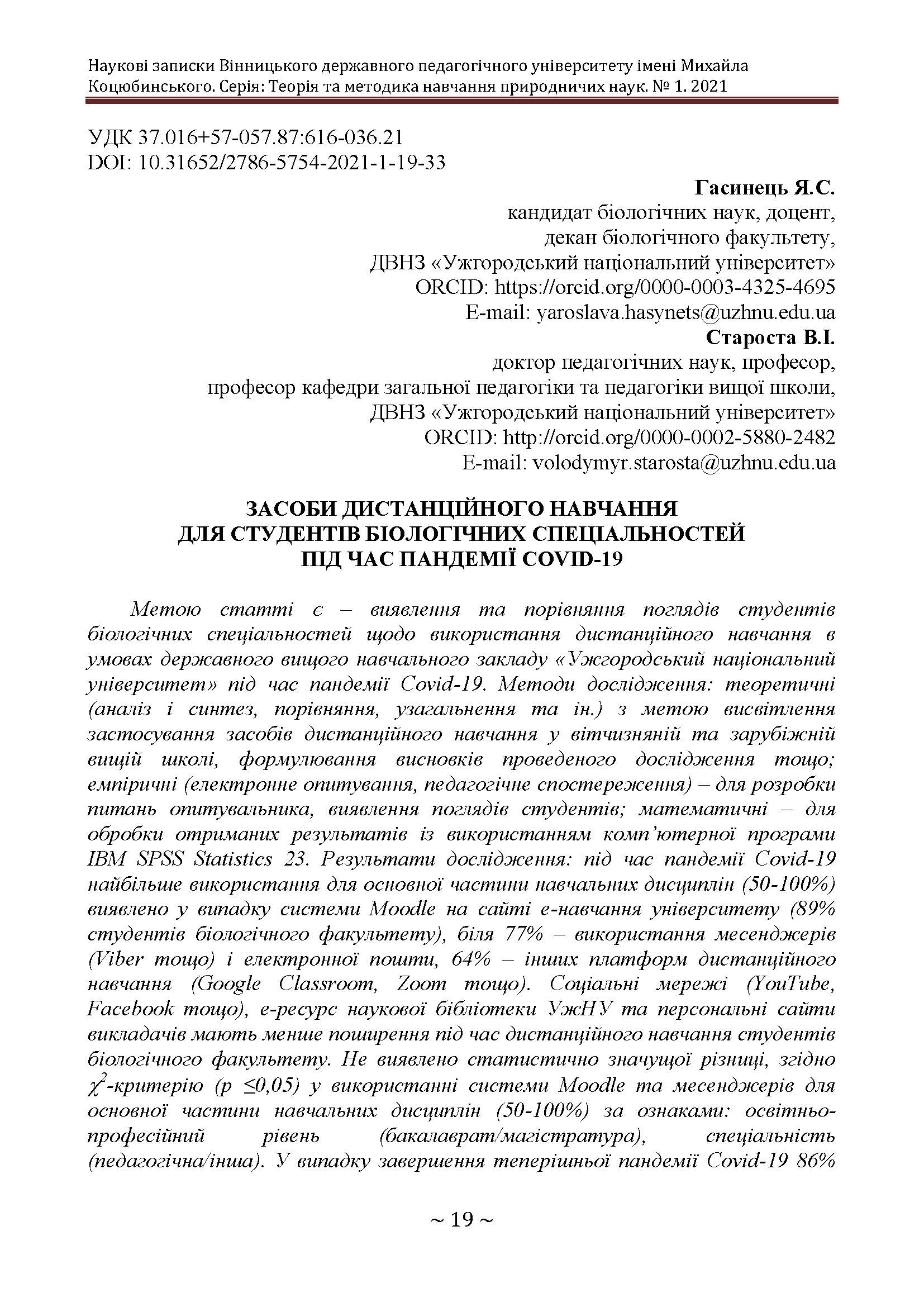Abstract
The article considers the state of distance learning of students of biological proffesions in the conditions of classical university during the Covid-19 pandemic. The purpose of the article is to identify and compare the views of students of biological proffesions on the use of distance learning in condition Uzhhorod National University during the Covid-19 pandemic. The authors used the following research methods: theoretical (analysis and synthesis, comparison, generalization, etc.) in order to highlight the use of distance learning in higher education, formulation of the conclusions of the study; empirical (electronic survey, pedagogical observation) – to develop questions of the questionnaire, to identify the views of students; mathematical – to process the results using the computer program IBM SPSS Statistics 23. We obtained the following specific results: during the Covid-19 pandemic, the greatest use for the main part of academic disciplines (50-100%) was found in the case of the Moodle system on the e-learning site of Uzhhorod National University (89% of students of the Faculty of Biology), about 77% – the use of messengers (Viber etc.) and e-mail, 64% – other platforms distance learning (Google Classroom, Zoom etc.). Social networks (YouTube, Facebook etc.), e-resource of the scientific library of Uzhhorod National University and personal sites of teachers are less widespread during the distance learning of students of the Biology Faculty. No statistically significant difference was found, according to the c2-criterion (p ≤0.05) in the use of the Moodle system and messengers during distance learning for the main part of academic disciplines (50-100%) on the grounds: educational and professional level (bachelor/master), profession (pedagogical/other). Bachelor (86%) and of master (89%) students want to study most academic disciplines (50-100%) in the Moodle after the end of the Covid-19 pandemic.
References
Височина І.Л., Авраменко І.В., Башкірова Н.С. Дистанційне навчання на кафедрі сімейної медицини ДЗ «Дніпропетровська медична академія МОЗ України» очима студентів-медиків другого курсу (аналіз результатів анонімного анкетування). Медична освіта. 2020. N 4. С. 5-9
Гончаренко С.У. Український педагогічний словник. К.: Либідь. 1997. 376 с.
Кадемія М.Ю., Шахіна І.Ю. Інформаційно-комунікаційні технології в навчальному процесі: Навчальний посібник. Вінниця, ТОВ «Планер». 2011. 220 с.
Новиков А.Д. Статистические методы в педагогических исследованиях (типовые случаи). М. : МЗ-Пресс. 2004. 67 с.
Про вищу освіту : Закон України від 01.07.2014 р. N 1556-VII. URL: https://zakon.rada.gov.ua/laws/show/1556-18 (дата звернення: 15.04.2021)
Про затвердження Положення про дистанційне навчання : наказ МОН України [зі змінами, внесеними наказом МОН України від 14.07.2015 р. N 761] URL: http://zakon.rada.gov.ua/laws/show/z0703-13 (дата звернення: 15.04.2021)
Про організаційні заходи для запобігання поширенню коронавірусу СОVID-19: Наказ Міністерства освіти і науки України від 16.03.2020 № 406. URL: https://mon.gov.ua/ua/npa/pro-organizacijni-zahodi-dlya-zapobigannya-poshirennyu-koronavirusu-s-ovid-19 (дата звернення: 15.04.2021)
Сисоєва С.О., Осадча К.П. Стан, технології та перспективи дистанційного навчання у вищій освіті України. Інформаційні технології і засоби навчання. 2019. Вип. 70. N 2. С. 271-284. DOI: https://doi.org/10.33407/itlt.v70i2.2907
Староста В.І. Moodle до, під час і після пандемії Covid-19: використання студентами бакалаврату та магістратури. Електронне наукове фахове видання «Відкрите освітнє е-середовище сучасного університету». 2021. Вип. 10, С. 216-230. DOI: https://doi.org/10.28925/2414-0325.2021.1018
Староста В.І. Використання комп’ютерно орієнтованих засобів дистанційного навчання у вищій школі (в умовах карантину 2020 р. в Україні). Неперервна освіта нового сторіччя: досягнення та перспективи: Матеріали VI Міжнародної науково-практичної конференції, 12-18 травня 2020 р. Електронний збірник наукових праць Запорізького обласного інституту післядипломної педагогічної освіти. Запоріжжя, 2020. №3(40)/2020. ISSN 2223- 4551.
URL: https://drive.google.com/file/d/1DtVaVZ0aZIEBa8f9l8MV2-w0igAkGs_2/view (дата звернення: 15.04.2021)
Abbas Z., Umer M., Odeh M., McClatchey R., Ali A., Farooq A. A semantic grid-based e-learning framework (SELF). In Proceedings of the CCGrid 2005. IEEE International Symposium on Cluster Computing and the Grid 2005, CWL, UK, 9–12 May 2005. Vol. 1. P. 11-18. Retrieved from: URL: https://arxiv.org/ftp/cs/papers/0502/0502051.pdf (accessed on 15.03.2021)
Al-Fraihat Dimah, Joy M., Masa'deh R., Sinclair J. Evaluating E- learning systems success: An empirical study. Computers in human behavior. 2020. Vol. 102. P. 67-86. DOI: https://doi.org/10.1016/j.chb.2019.08.004
Alqahtani A.Y., Rajkhan A.A. E-Learning Critical Success Factors during the COVID-19 Pandemic: A Comprehensive Analysis of E-Learning Managerial Perspectives. Education Sciences. 2020. Vol. 10. N 9:216. 16 pages. DOI: https://doi.org/10.3390/educsci10090216
El Firdoussi S., Lachgar M., Kabaili H., Rochdi A., Goujdami D., and El Firdoussi L. Assessing Distance Learning in Higher Education during the COVID-19 Pandemic. Education Research International. 2020. Vol. 2020, Article ID 8890633, 13 pages. DOI: https://doi.org/10.1155/2020/8890633
Ghouname, N. Moodle or Social Networks: What Alternative Refuge is Appropriate to Algerian EFL Students to Learn during Covid-19 Pandemic. Arab World English Journal. 2020. Vol. 11. N 3. Р. 21-41. DOI: https://dx.doi.org/10.24093/awej/vol11no3.2
Olivares, S.T.; Vazquez, A.M.; Toledano, R.M. La Docencia Virtual o e- Learning como Solución a la Enseñanza de la Física y Química de los Futuros Maestros en tiempos de COVID-19/Virtual Teaching or e-Learning as a Solution to the Teaching of Physics and Chemistry of Future Teachers in times of COVID-19. Revista Española de Educación Comparada. 2021, Vol. 38, Р. 190-210. DOI: https://doi.org/10.5944/reec.38.2021.28853
Voronova, E., Lapshova, A., Bystrova, N., Smirnova, Z., & Bulaeva, M. Organization of virtual interaction in the context of the coronavirus pandemic. Propósitos y Representaciones. 2020. Vol. 9 (SPE1). e820. 8 pages. DOI: http://dx.doi.org/10.20511/pyr2021.v9nSPE1.820

This work is licensed under a Creative Commons Attribution 4.0 International License.
Copyright (c) 2021 Ярослава Гасинець, Володимир Староста

